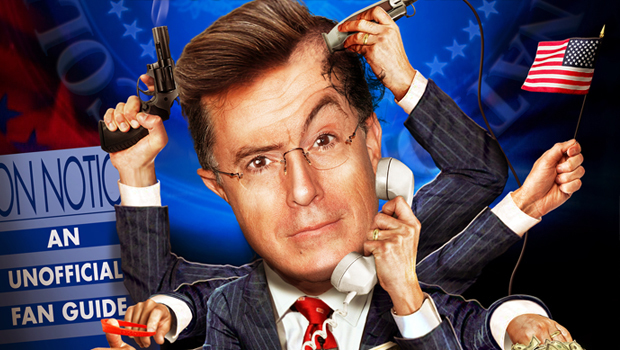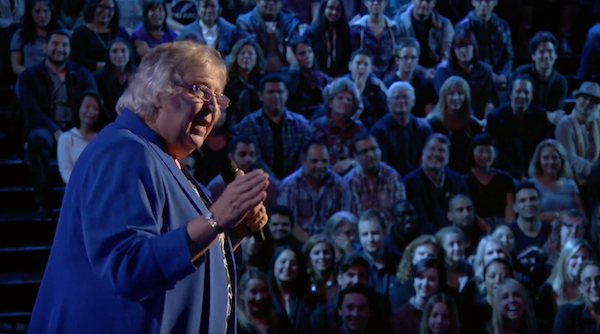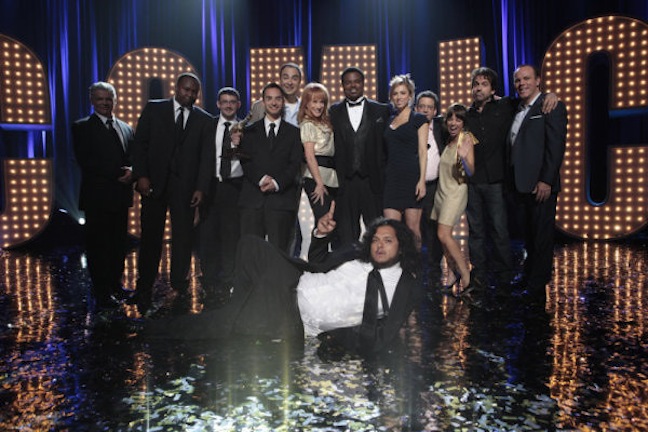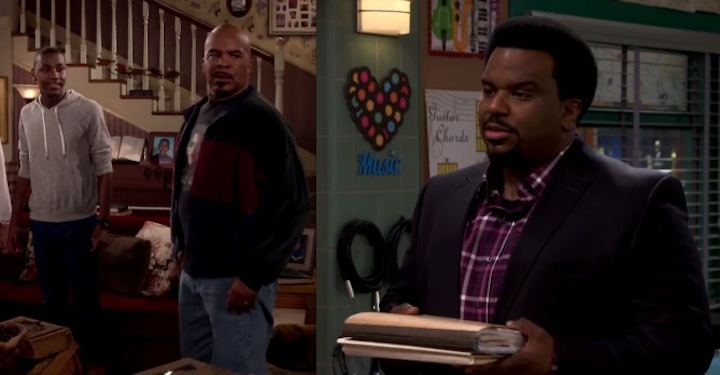With only eight shows left, “Stephen Colbert” is going out with a bang on Comedy Central these next two weeks, starting tonight with a field trip to Washington, D.C., to sit down with President Barack Obama.
It’s been a long, strange, wonderful trip with The Colbert Report.
And we’re all going to miss Colbert’s alter-ego when he’s gone. Perhaps no one as much as Sharilyn Johnson, a comedy journalist and critic from Toronto (Third Beat Magazine) who has just co-authored the unofficial but essential fan guide to the show, Bears & Balls: The Colbert Report A-Z.
A friend of the site, Johnson chatted with The Comic’s Comic about her own journey as a fan of The Colbert Report (she also has written and performed her own one-person show, Fake News Fangirl, which dives deeper into the impacts Jon Stewart and Colbert have had on her life and career).
Which came first: Your desire to write and perform a one-person show about the fake news, with “Fake News Fangirl,” or your desire to write and publish a book about The Colbert Report?
The show was first. I started writing Fake News Fangirl in 2010, and staged it in 2011. The book wasn’t even a thought until just this past April, when we learned The Colbert Report would be ending. In the seven months between the book’s conception and publication, I did my final performances of Fake News Fangirl. So there was overlap, but fortunately Colbert Overload isn’t a fatal condition.
Since you already were an avid fan of The Daily Show, what did you make initially of Colbert’s decision to create his “Stephen Colbert” alter-ego when he launched The Report?
The character existed before the Report did. He described his on-screen persona as a “high-status idiot” even when he was still a Daily Show correspondent. He just wasn’t as well defined. In 2003, The Daily Show started airing a series of fake promos for a fake show called The Colbert Report, with Stephen as the shouting pundit. It made enough sense even then to put him in that hypothetical role. The entire pitch for the actual Colbert Report was just to make those promos into a real show. The groundwork had been laid, so it was a relatively organic transition in that sense.
But Daily Show correspondents aren’t explicitly presented to us as characters, and we only see them in small doses. Viewers wouldn’t have perceived “Stephen” as an obvious alter ego until the Report solidified it, and journalists took interest in reporting on “the real Stephen Colbert.”
As for my first impression of the show itself, I was skeptical about its longevity. I wasn’t sure he could sustain that character four nights a week. That may have been less about my cynicism, and more about me still mourning the loss of Tough Crowd.
Since you’re Canadian, I suppose I shouldn’t let this conversation get too far without first finding out how “Stephen Colbert” might play differently/stronger to a Canadian audience than he would here in the States?
Canadians have a sense of being outsiders. We’re the high school quarterback’s nerdy little brother. That informs the comedy we produce here, and we’re drawn to comedy produced elsewhere that has that same outsider point of view. While “Stephen” is the status quo, he’s obviously used as a means to deliver the opposite perspective.
We love Americans as individuals. You’re lovely people, and we want the best for you. But collectively, you’re insane. Watching American political satire to us is like watching a horror film versus being in a horror film. We’re safely curled up on the couch with our popcorn, but that poor woman is being chased through the woods in high heels, and if she falls and needs medical care, does her COBRA plan cover that?
We have the luxury of being informed about, yet detached from, many of the issues talked about in late night satire. The sense of catharsis that Americans might feel when watching those shows might be lesser for us. More pure entertainment, because we aren’t burdened with some of these issues to begin with. However, all this would apply to a small percentage of Colbert’s content. I’d be harder pressed to analyze our differing consumption of the Jerky Blaster segment.
I’m glad you mentioned that “Colbert” came into existence pre-Report. Because my memory doesn’t recall that at all. I remember him having other segments on TDS, and distinctly recall the week he substituted for Jon and thinking, oh, that’s not working, at all. So for me, his character elevated his hosting skills and gave him such a deliciously devious perspective to present opinion news about opinion news. Does that jive with your more closely-hewn analysis and recordkeeping of such?
When Jon was away filming Death to Smoochy in 2001, the correspondents rotated as guest hosts. Those episodes were about as good as one could expect when show’s star and editorial voice was off getting a bowl cut. I think you’re on to something when it comes to playing a character in that context, though. Colbert and Steve Carell co-hosted when Richard Lewis was the guest. The interview is wonderfully ridiculous, but they made the choice right away to be themselves and disown the previous segment as a “sketch.” I understand why, because they were trying their best to emulate Jon, but they were utterly outmatched as a result. In that sense, it didn’t work.
When Colbert filled in solo at that time, I think he did a fine enough job, again considering he wasn’t Jon. He hosted an episode again in 2004 when Jon’s son was born, and his interview with Ralph Nader was much more like the Colbert character we’re familiar with. I could be biased, but since that was just two months before they pitched the Report to Comedy Central, it couldn’t have been a disaster.
On the Report, the character and the format were absolutely perfect vehicles for Colbert to deliver his satire through. A perfect storm in that sense. But the character didn’t necessarily elevate his hosting skills. I think simply time and experience elevated his hosting skills. Looking at the initial eight weeks of the Report, or even the first year, you can see he’s less confident and flexible in his performance. We remember the show being amazing right off the bat, but he ended up proving there was room for improvement.
Yeah. That’s what I remember of the old Colbert substitute host, him trying to be Jon, instead of being his own thing, or even another thing entirely.
When you were writing the book, then, was there anything that surprised you in going back over the years and Colbert’s evolution? Anything you’d forgotten or overlooked before that jumped out at you in 2014?
I’ve dipped into the archives on a regular basis over the years, so it’s hard to surprise me. I was a little taken aback when I realized that the Super PAC game, from start to finish, lasted almost two years. Time flies. It’s also interesting to see how many memorable moments happened in the first year of the show: Truthiness, the Charlene video, Green Screen Challenge, Hungarian bridge, Tek Jansen shorts. It’s a long list.
What I think would surprise others is how rigid Colbert and the character were in those first eight weeks of the show. Even his voice was different. And he certainly wasn’t at the point where he could let the audience see him break character, as he does fairly frequently now. The overall sense of fun increased substantially over the years. And that’s on the audience’s part too. The studio sat about 40% fewer people in the beginning compared to now, often consisting of overflow from The Daily Show, and you can hear the difference in those early episodes.
How many Colbert tapings have you been to? 13
When was your first?
My first was July 19, 2006. The top of my head made its national television debut in the shots of Paul Dinello in a bit about Oprah.
That first taping certainly left a mark on me. I obviously see a lot of live comedy, but I’d never seen anyone engage an audience the way Stephen did, even before the cameras started rolling. He runs out, he dances, he answers a batch of questions from the audience. You know how sometimes you watch someone in front of an audience, and you get the sense that they genuinely like people? He’d have to confirm whether that’s true, but I got a strong sense that he just loves making that connection. The first time I experienced the energy and joy of his performance off-camera, I was floored. Witnessing that never got old, even if many aspects of the taping experience became predictable.
Did you go on a regular schedule? And what were your “tricks” to obtaining tickets?
Ticketing methods varied. I went to a few as a VIP through staff members, but I don’t like to abuse that, and the experience isn’t all that different from being a general ticketholder anyway. So generally I booked just like anyone else.
The first few years of the show’s run, you would email them your preferred dates, and they’d email you back with a “ticket.” They used to get about one request per minute back then, so mercifully they moved to an automated system I believe in late 2007. It’s more like booking a hotel room now. You pick your date, fill out the form with your info, and submit it. There’s a fan-run Twitter account called @DailyTix that scrapes both sites and immediate tweets out availabilities for both the Daily Show and Colbert. Even though it seems like both sites are always sold out, tickets frequently pop up week-of and even day-of, so they’re easy to get if you’re diligent and a quick typist.
I was on a schedule, yes. They implemented a six-month rule very early on, so you can’t go more than twice per year. That’s probably best for my bank account. I skipped a few of my “turns” because, contrary to popular belief, real life did get in the way sometimes. I still lived in Winnipeg when I attended my first two, so I would tag a New York trip onto my annual July trek to Montreal for Just For Laughs. Once I moved to Toronto, I did November-May for a few years, and it became a December-June at one point. My final taping was August 28 of this year.
How did the in-person viewing experience change for you over the years?
It’s surprising how little the taping experience changed in nine years, actually. The seating was reconfigured in 2010 to accommodate more people, but the holding room you wait in beforehand didn’t get any bigger. That was a tight squeeze and a long damn wait, which none of us will miss. Otherwise, it’s minutiae that only regulars would pick up on. There’s a section in the book about tapings that covers the experience, including details like what songs are played in the studio during breaks. But we were careful to not make that a tedious rundown of every single step in the process.
So now that you’ve closed the books on Colbert, how do you suggest comforting fellow fans who either will miss the show and/or worry about how the “real” Colbert will fare on CBS next year?
Obviously the best way fans can comfort themselves is to keep this book at their side at all times, in the event of sudden-onset Report withdrawal.
We’re all going to miss the show. But having seen how dynamic a performer Stephen is as himself, I have no concerns about how good he’ll be at CBS. I worry about the general viewing public a bit, because there’s some education that has to happen for everyone to really get who Stephen is without the character. I see a lot of confusion about that online. For that reason, it may or may not be a rough start as far as audience response goes, but I think it’s all going to come together quickly. Some fans are more stressed out about it than others, but a year from now we’ll look back at the hand-wringing and cringe.
Since your book is labeled as an unofficial fan guide, was that on purpose or did you try to write this officially with Comedy Central? And how do you feel about Colbert himself knowing about the book, especially now that you know firsthand that he knows about its existence?
We obviously would have loved the book to be “official.” Partly for perception, because books like this are often born out of market research and opportunism rather than a genuine passion for the subject matter. But what we really wanted out of it was the access to resources that would help us with research. A searchable script database would have cut our workload almost in half.
Rather than first approaching my producer contacts at the Colbert Report, I first reached out to one of the higher-ups in Comedy Central’s licensing division. There was a bit of back and forth, but ultimately they declined involvement — on behalf of both themselves and the show, which was a little surprising. Since the show had supposedly said no, we didn’t push the issue.
I’ll be totally honest, though: logistics aside, I don’t think the book would have turned out any better with total access. I’ve listened to some interviews with the writers, and even some of what they say has me going “um, actually, that’s not entirely the case….” I think the book really does benefit by being purely from the perspectives of two hyper focused – but not hyper – fans.
The epilogue is that I recently spoke with Stephen directly, and it’s my understanding that he was previously unaware of the book. That suggests to me that maybe Comedy Central’s response wasn’t necessarily to be taken at face value. Live and learn.
Stephen expressed interest in having a copy, so there will be one crossing his desk. This will be an incredibly busy and pressure-filled month for him, though, and actually reading it wouldn’t be the wisest use of his time right now. But we’re hopeful he’ll at least skim it, and be as pleased with it as we are.
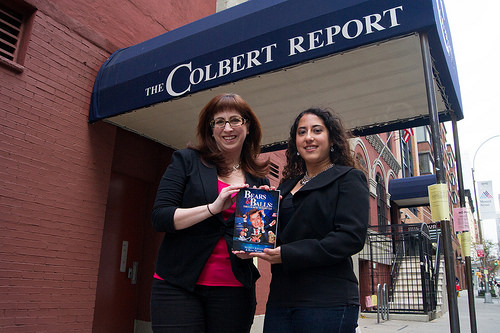
Bears & Balls: The Colbert Report A-Z, by Sharilyn Johnson and Remy Maisel, is available now.
And since you scrolled all the way down, here’s a fun look back at the best of Colbert cracking up on camera. Roll it!

